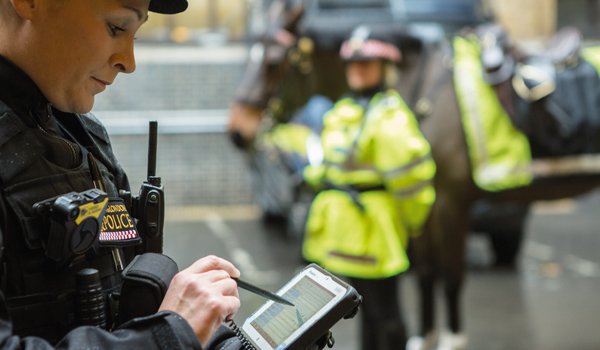Speeding up justice
The Crown Prosecution Service (CPS) has committed to deliver a far more digital criminal justice system by April 2012, including the use of electronic witness statements and electronic case files by the police service to help improve efficiency and reduce costs.

The Crown Prosecution Service (CPS) has committed to deliver a far more digital criminal justice system by April 2012, including the use of electronic witness statements and electronic case files by the police service to help improve efficiency and reduce costs.
Trials of electronic witness statements (EWS) are about to conclude at two early adopter forces Hampshire Constabulary and Avon & Somerset Constabulary and feedback from key stakeholders and the data collected will be reviewed to develop an EWS national standard designed to help speed up and streamline the criminal justice process.
The pilots form part of the Transforming Through Technology (T3) programme, a project designed to move the Crown Prosecution Service (CPS) from paper-based processes to a full digital way of working.
It comprises three main strands: electronic case working; knowledge and information management; and infrastructure improvement. It will enable the CPS to routinely work on and share electronic case information within the service and externally.
T3 aims to link police and CPS computer systems to allow information to be shared automatically, end wasteful practices of photocopying, faxing and re-keying paper records and to make case files available at the click of a button.
As well as making the CPS more efficient, T3 will be crucial to allowing the CPS to meet its commitment to the Treasury to reduce its budget by about five per cent each year until 2014-15.
The CPS has worked closely with partners in the criminal justice system (CJS) to promote the case for digitalisation, not just of the CPS, but crucially for the CJS as a whole, and the CJS Operational Board, comprising senior representatives from all the major criminal justice agencies, is now committed to delivering a far more digital CJS by April 2012.
Work has already begun to upgrade the CPSs existing technology infrastructure and software to provide increased digital capacity and capability. Changes have been made to enable a two-way exchange of data between the police and the CPS and to broaden the range of information that can be transferred through the information-sharing portal CJS Exchange to enable greater digital working. The first sites plan to use the two-way link by the end of this summer.
The infrastructure upgrades to support the T3 programme come from a £125 million contract extension that the CPS struck with its IT suppliers Logica and Global Crossing in 2009.
Six lead areas early adopter sites have been testing various aspects of digital working throughout the past year, going as far as possible to move away from paper and work digitally with partner agencies.
At Liverpool Crown Court in May, for example, tablet-style electronic devices were used to access case information. It was the first time in England and Wales that a whole days list in a Crown Court had been delivered using this type of technology, with both the court and CPS working without paper.
Elsewhere, increasing use is being made of electronic presentation of evidence in more complex cases.
Electronic benefits
EWS allows witness statements to be created digitally, with an electronic signature replacing the traditional, handwritten ink one. This is captured via a mobile data terminal, with the witness using a stylus to sign the screen or an electronic pad.
EWS will deliver a range of benefits throughout the criminal justice system, including:
an improved service for victims and witnesses;
time savings for frontline officers;
faster access to information; and
the ability to electronically send statements to criminal justice partners, including the defence.
Around 150 police officers based in Gosport and on the Isle of Wight were the first in Hampshire Constabulary to use the new technology. Data from the initial 12-week trial, supported by the National Policing Improvement Agency (NPIA)


